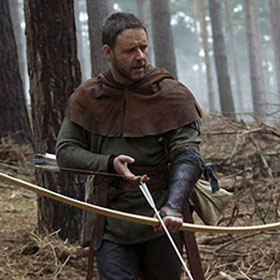Robin Hood

3/5
It would be going too far to suggest that Mel Brooks' singular form of parody is perhaps the last word in genre fiction. But when a particular story finds itself told so often and with such indistinguishable, uniform conformity that such a thing as Robin Hood: Men in Tights can even come to pass, you know that the tale is perhaps a little worn in the telling. Be it Erol Flynn's swashbuckling fop, or Kevin Costner's stoned California beach-bum, we by now know what we're in for – robbing the rich, gifting the poor; a man wronged, persecuted, resurgent, and triumphant…yawn.
Clearly very painfully aware of this, Sir Ridley Scott – who lest we forget breathed new life into the done and dusted swords & sandals genre with Gladiator – has long wrestled with just how exactly to waft a fresh breeze through the hallowed oaks of Sherwood. Ideas of role reversals, with Crowe set to play first the dastardly Nottingham, then reportedly both Sheriff and Hood were banded about, neither of which ultimately materialized. Finally Scott stumbled on an obscure piece of English history which saw a libertarian proposal, in the form of the Forest Charter, raised by the people and struck down by the crown in favor of the infamous, oppressive legislation that was The Magna Carter. Armed with this nugget of populism Scott set about rewriting the age-old folktale, transforming Robin of the Hood into not so much an outlaw as a 12th century political activist.
Opting for a blood and mud type approach, Scott's epic take on the Hood legend, drenched as it is in Middle-Age English politics, is simply too far removed from it's hero to ever really be compelling. Trading character development for scope Scott's Robin Longstride, a common archer driven to impersonate the dead heir of a dying nobleman (Max Von Sydow) to insure an impoverished Nottinghamshire town doesn't have it's land seized, remains an indecipherable cipher, driven by muddled motivation and ultimately crowded out of his own story by a horde of squabbling, scheming aristocracy.
Nottingham, Robin's great arch-enemy, barely gets so much as a look in. Neither do the Merry Men. Instead the role of big-bad falls to Mark Strong's Lord Godfrey, who replacing William Hurt's deposed Chancellor feigns allegiance to the crown all the while plotting England's downfall with the King of France. With so many fine thespians in the mix it's an illustration of the script's constantly shifting focus that only Oscar Isaac as King John really captivates, his ridiculous posture seeming to ebb and flow with his mood and the actor's deft comic touch somehow managing to make him simultaneously both tyrannical and hilariously whiney.
Crowe meanwhile is tasked with little more than gruffing it up, "ay up me duck"-ing his way through a painfully implausible romance with Cate Blanchett's rough around the edges Lady Marion. Between them you'll find more spark in a rubber factory, but such is the way the camera fawns all over their every lingering, suggestive glance that you half expect Bryan Adams to come strolling out from behind a tree and start giving it the old: "Everything I do…"
Even the second unit looks uninspired, hampered as they are by a rating that prohibits much in the way of carnage, contributing two major set piece battle sequences; the first of which riffs on a far more arresting sequence from Braveheart, and the second being a bizarre medieval restaging of Private Ryan's Omaha Beach with some laughably advanced French naval craft. Sandwiched between those two lackluster clashes is simply too much story for one movie to digest, and the fuzzy sketching of a few too many fringe players hints that there is even more left on the cutting room floor. Perhaps a forthcoming DVD director's cut can manage to needle out a few knots from the knit. It worked for Kingdom of Heaven.
Starring: Russell Crowe, Cate Blanchett, Mark Strong, William Hurt, Oscar Isaac, Mark Addy, Kevin Durand
Director: Ridley Scott
Runtime: 141 Minutes
Distributor: Universal
Rating: PG-13
RELATED ARTICLES
Get the most-revealing celebrity conversations with the uInterview podcast!







Leave a comment